- Home
- Elizabeth Goudge
The Dean's Watch
The Dean's Watch Read online
The Dean’s Watch (eBook edition)
Hendrickson Publishers Marketing, LLC
P. O. Box 3473
Peabody, Massachusetts 01961-3473
eBook ISBN 978-1-61970-081-9
THE DEAN’S WATCH © 1960 by Elizabeth Goudge. Copyright renewed 1998 by S. S. Gerard Kealey and Jessie Monroe.
All rights reserved. No part of this book may be reproduced or transmitted in any form or by any means, electronic or mechanical, including photocopying, recording, or by any information storage and retrieval system, without permission in writing from the publisher.
Due to technical issues, this eBook may not contain all of the images or diagrams in the original print edition of the work. In addition, adapting the print edition to the eBook format may require some other layout and feature changes to be made.
First eBook edition — July 2012
For
MILDRED WOODGATE
EPITAPH IN LYDFORD CHURCHYARD
Here lies in a horizontal position the outside case of
George Routledge, Watchmaker.
Integrity was the mainspring and prudence
the regulator of all the actions of his life;
humane, generous and liberal,
His hand never stopped till he had relieved distress.
So nicely regulated were his movements that
he never went wrong, except when set going
by people who did not know his key.
Even then he was easily set right again.
He had the art of disposing of his time so well,
that his hours glided away, his pulse stopped beating.
He ran down November 14, 1801, aged 57,
In hopes of being taken in hand by his Maker,
Thoroughly cleaned, repaired, wound up, and
set going in the world to come, when
time shall be no more.
THE AUTHOR
ELIZABETH Goudge, born at the turn of the 20th century in England, was a gifted writer whose own life is reflected in most of the stories she wrote. Her father was an Anglican rector who taught theological courses in various cathedral cities across the country, eventually accepting a Professorship of Divinity at Oxford. The many moves during her growing-up years provided settings and characters that she developed and described with great care and insight.
Elizabeth’s maternal grandparents lived in the Channel Islands, and she loved her visits there. Eventually several of her novels were set in that charming locale. Her mother, a semi-invalid for much of her life, urged Elizabeth to attend The Art College for training as a teacher, and she appreciated the various crafts she learned. She said it gave her the ability to observe things in minute detail and stimulated her imagination.
Elizabeth’s first writing attempts were three screenplays which were performed in London as a charity fund-raiser. She submitted them to a publisher who told her to go away and write a novel. “We are forever in his debt,” writes one of her biographers.
Contents
Copyright
Dedication
Epitaph
The Author
1. Isaac
2. The City
3. Angel Lane
4. Job
5. The Dean’s Watch
6. Fountains
7. Miss Montague
8. Sunday Morning
9. The Mouse
10. Bella
11. Swithin’s Lane
12. King Lear
13. The Umbrella
14. Advent
15. The Celestial Clock
16. The Cathedral
17. Christmas
18. The Swans
1. Isaac
1.
THE candle flame burned behind the glass globe of water, its light flooding over Isaac Peabody’s hands as he sat at work on a high stool before his littered worktable. Now and then he glanced up at it over his crooked steel-rimmed spectacles and thought how beautiful it was. The heart of the flame was iris-colored with a veining of deep blue spread like a peacock’s tail against the crocus and gold that gave the light. He had oil lamps in the shop and workshop but lamplight was not as beautiful as his candle flame behind the globe of water, and for work requiring great precision its light was actually not quite so good. And he liked to feel that through the centuries men of his trade, clockmakers, watchmakers, goldsmiths and silversmiths, had worked just as he was working now, in their workshops after the day’s business was over, alone and quiet, the same diffused light bathing their hands and the delicate and fragile thing they worked upon. It banished loneliness to think of those others, and he was not so afraid of the shapeless darkness that lay beyond the circle of light. He did not like shapelessness. One of his worst nightmares was the one when he himself became shapeless and ran like liquid mud into the dark.
For any painter it would have been a joy to sit in the corner of Isaac’s workshop, unseen by Isaac, and paint him in his pool of light, but only Rembrandt could have painted the shadows that were beyond the light. They seemed to hang from a vast height, as in Rembrandt’s “Adoration of the Shepherds,” and if here they were looped back to show, not the holy family but one grotesque old man, yet adoring wonder was not absent, for Isaac had never grown up and things still amazed him. He was amazed now as he looked worshipfully at the beautiful thing he held. This child’s gift of wonder could banish his many fears but the balance was precariously held.
He looked safe enough tonight in his halo of warm light. He was a round-shouldered little man with large feet and a great domed and wrinkled forehead, the forehead of a profound thinker. Actually he thought very little about anything except clocks and watches, and about them he not so much thought as burned. But he could feel upon a variety of subjects, and perhaps it was the intensity of his feeling that had furrowed his forehead, lined his brown parchment face and whitened the straggling beard that hid his receding chin. His eyes were very blue beneath their shaggy eyebrows and chronic indigestion had crimsoned the tip of his button nose. His hands were red, shiny and knobbly, but steady and deft. He dressed in the style of twenty years before, the style of the eighteen-fifties, because the clothes he had had then were not yet what he called worn out. His peg-topped trousers were intensively repaired across the seat but that did not show beneath his full-skirted, bottle-green coat. The coat was faded now, and so was the old soft crimson bow tie he wore, but the dim colors were eminently paintable against the great draped shadows, and richly illumined by the moony light. His soft childish mouth was sucked in with concentration except when now and then he pouted his lips and there emerged from them a thin piping whistle.
He was happy tonight, for one of his good times was on the way. Everything he did today, anything he saw or handled, had shape as though the sun were rising behind it. Presently it would happen to him, the warmth and glow and self-forgetfulness, and after that for a few moments or a few days he would be safe.
He had finished. The Dean’s watch was now once more repaired and he knew he could not have made a better job of it. He held it open in the palm of his hand and gazed at it with veneration, his jeweler’s eyepiece in his eye. It was inscribed George Graham fecit, 1712. At that date Graham had been at the height of his powers. The inscription took Isaac back to the old bow-windowed shop in Fleet Street, next door to the Duke of Marlborough’s Head tavern, which had been a place of pilgrimage for him when as a lad he had served his apprenticeship in Clerkenwell. Graham had worked in that shop, and lived and died in the humble rooms above it. Charles II’s horologist Thomas Tompion, whom men called the father of English clockmaking, had been Graham’s uncle. Both men had been masters of the Clockmakers’ Company and they had been buried in the same tomb in Westminster Abbey. Whenever he
held the Dean’s watch in his hands Isaac remembered that George Graham’s hands had also held it, and that perhaps Tompion in old age had looked upon his nephew’s handiwork and commended it.
It was not only a beautiful watch but an uncommon one. It had a jeweled watch cock of unusual design, showing a man carrying a burden on his shoulders. Isaac had seen hundreds of watch cocks during his professional life, and many of them had had impish faces peeping through the flowers and leaves, but never so far as he could remember, one showing a human figure. The pillars were of plain cylindrical form, as in most of Graham’s watches. He had never favored elaborate pillars; like all great craftsmen he had always made ornament subsidiary to usefulness. Isaac closed the thin gold shell that protected the delicate mechanism and turned the watch over. It had a fine enameled dial with a wreath of flowers within the hour ring. The outer case was of plain gold with the monogram A.A. engraved upon one side, and upon the other a Latin motto encircling the crest of a mailed hand holding a sword.
Isaac laid the Dean’s watch down on his workbench, amongst the others he had finished repairing today, and opening a drawer took out an envelope full of watch papers neatly inscribed in his fine copperplate handwriting. The majority of horologists no longer used these but Isaac was attached to the old customs and liked to preserve them. In the previous century nearly every watch had had its watch pad or paper inserted in the outer case, either a circular piece of velvet or muslin delicately embroidered with the initials of the owner, or else the portrait of the giver, or a piece of paper inscribed with a motto or rhyme. Isaac had collected and written out many of these rhymes, and he would always slip a watch paper into the outer cases of the watches of the humbler folk, for their amusement and delight. He did not dare to do so with his aristocratic customers; he feared they would think him presumptuous. He shook out the papers and picked out one here, one there. This would do for Tobias Smalley, landlord of the Swan and Duck, who was a rare old grumbler.
Content thy selfe withe thyne estate,
And send no poore wight from thy gate;
For why, this councell I thee give,
To learn to dye, and dye to live.
And this, he thought, for Tom Hochicorn, one of the Cathedral bedesmen, a very good old man who believed in God.
I labour here with all my might,
To tell the time by day or night;
In thy devotion copy me,
And serve thy God as I serve thee.
He slipped the watch papers into their various cases and then wrapped the Dean’s watch in wadding and laid it away in a stout little box. Tears were in his eyes, for he would not see it again until the Dean once more overwound it or dropped it. His fear of the terrible Dean was always slightly tempered by anger because he took insufficient care of his watch, and then again by gratitude because but for the Dean’s carelessness he would never have the lovely thing in his hands at all, for its mechanism was faultless. Because of this anger and gratitude he possibly had a warmer feeling for the Dean than most people in his Cathedral city.
Isaac took his own watch from his pocket and looked at it. It was a severely plain silver timepiece with tortoise-shell pair cases. He had made it for himself years ago. It said three minutes to eight and Isaac was dismayed. It was later than he had realized and if he did not hurry he would be late for supper and incur his sister’s displeasure. Yet the dismay quickly passed, for today nothing had power to disturb him for long. He waited, his watch in his hand; in a moment or two the city clocks would strike the hour and he liked to correct their timekeeping by his own faultless watch. It was quiet in the workshop, no sound but the rustle of a mouse behind the wainscot. It was a frosty October night of moon and stars and there was no wind. The city was still. There was no rattle of cab wheels over the cobbles, no footsteps ringing on the pavement; everyone was at home having supper. Isaac was aware of all the lamplit rooms in the crooked houses, little and big, that climbed upon each other’s shoulders up the hill to the plateau at the top where the Cathedral towered, looking out over the frozen plain to the eastern sea. Another night he would have shivered, remembering the plain and the sea, but tonight he remembered only the warm rooms and the faces of men and women bent over their bowls of steaming soup, and the children already asleep in their beds. He felt for them all a profound love, and he glowed. The moment of his loving was in the world of time merely sixty seconds ticked out by his watch, but in another dimension it was an arc of light encircling the city and leaving not one heart within it untouched by blessedness. Then the clocks began to strike, and the light of the ugly little man’s moment of self-forgetfulness was drawn back again into the deep warmth within him. And he understood nothing of what had happened to him, only that now, for a little while, for a few moments or a few days, he would be happy and feel safe.
The Cathedral clock, Michael, started to strike first, in no hurry to precede the others yet arrogantly determined upon preeminence. Its great bell boomed among the stars, and the reverberations of its thunder passed over the city toward the plain and the sea. Not until the last echo had died away was the city aware that little Saint Nicholas at the North Gate had been striking for some time. Only two of his light sweet notes were heard, but little Saint Nicholas was dead on time. Saint Peter in the market place waited for Nicholas to finish and then coughed apologetically, because he knew that his deep-toned bell was slightly cracked and he himself half a minute late. Saint Matthew at the South Gate struck a quick merry chime and did not care if he was late or not. Last of all Isaac’s clocks in the shop all struck the hour, ending with the cuckoo clock. He kept them all a little slow so that he could enjoy their voices after the clocks of the city had fallen silent. Having refereed them all in past the tape, he put away his own timepiece and rose slowly to his feet to set about the ritual of the Friday night shutting up of the shop.
In an old leather bag that had a lock and key he reverently placed the mended watches of those gentlemen and gentlewomen of the city who were too incapacitated by rank, age or wealth to do their own fetching and carrying. These he would deliver tomorrow, for on Saturday the shop remained closed and he spent the day delivering watches and winding clocks. Every clock of importance in the aristocratic quarter of the city, the Close and Worship Street, was in his care, intimately known to him and loved and cherished during half a lifetime. There was a smile of great tenderness on his face as he remembered that tomorrow he would see them all again. The watches of the great locked away in the leather bag, the watches of the lesser folk were placed in a drawer to wait till called for, but with no less reverence either for themselves or for their owners. Isaac’s humility did not discriminate between man and man and scarcely between man and watch. In his thought men were much like their watches. The passage of time was marked as clearly upon a man’s face as upon that of his watch and the marvelous mechanism of his body could be as cruelly disturbed by evil hazards. The outer case varied, gunmetal or gold, carter’s corduroy or bishop’s broadcloth, but the tick of the pulse was the same, the beating of life that gave such a heartbreaking illusion of eternity.
The watches put away, his eyes went to the clock that he was making in his spare moments. There had been no time to work at it tonight but he could spend a moment or two before it in adoration. He was always making a clock in his spare moments, most of them after the patterns of the older craftsmen whom he loved the best, but enriched always with some touch of genius that was all his own. Isaac was artist as well as craftsman. He did not need to employ another man to design his clock cases or do his marquetry for him. What his imagination conceived his own brain and hand and eye could bring to perfection without help from another. But he did sometimes wish he could have had an apprentice, not only to tramp around the city with watches and clocks and serve in the shop but to be his pupil. He was a born teacher and he would have liked to impart his knowledge. But it was impossible. The seven years’ training insisted upon by the Clockmakers’ Company, five years as appren
tice and two as journeyman, and then the necessity of producing a masterpiece that could be approved by the Company before the apprentice could be admitted to be a workmaster, was daunting to poor boys in provincial cities, and if one here or there should aspire to it he preferred to go to London as Isaac himself had done. Yet he went on hankering for the unattainable, for with a good apprentice to help him he would have had more time for the creation of the clocks that he seldom failed to sell when they appeared in his shop window, so lovely were they and so cheap. He had no idea of money; he mostly forgot to send his bills in and he delighted in mending the watches of poor men for nothing. He had no idea either of the value of his clocks but even if he had known that in the next century they would be eagerly sought after in the sale rooms of Europe he would still have sold them as cheaply as he could to the men and women of the city, because he loved the city. It was his city. He had been born within its walls and had never left it except for those seven years in London.
The clock that Isaac was making now he did not visualize in his shop window because it was so much a part of him that he could have as easily visualized his eyes or brain or hands in the window as this clock. He did not think about its future because it was the future. He did not consciously tell himself that it was his eternity but he had a confused idea that the dark would not entirely get him while the pulse beat on in this clock.
Standing before the solid oak table which was sacred to his clock alone, his heart beat high with joy at what he saw. No one else would have seen anything except a confused jumble of mechanism, but Isaac saw his clock as it would be. He saw the accomplished thing and knew that he would make it, and that it would be his masterpiece. Like all creators, he knew well that strange feeling of movement within the spirit, comparable only to the first movement of the child within the womb, which causes the victim to say perhaps with excitement, perhaps with exasperation or exhaustion, “There is a new poem, a new picture, a new symphony coming, heaven help me.” The movement had been unusually strong when he first knew about this clock.

 The Rosemary Tree
The Rosemary Tree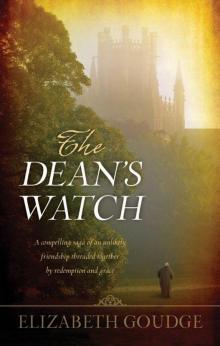 The Dean's Watch
The Dean's Watch Linnets and Valerians
Linnets and Valerians Gentian Hill
Gentian Hill B00DRI1ZYC EBOK
B00DRI1ZYC EBOK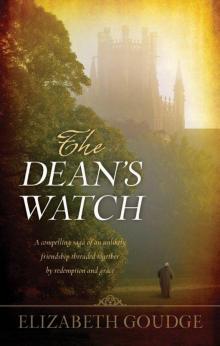 B008O6ZWTG EBOK
B008O6ZWTG EBOK The Scent of Water
The Scent of Water Pilgtim's Inn
Pilgtim's Inn Island Magic
Island Magic Pilgrim's Inn
Pilgrim's Inn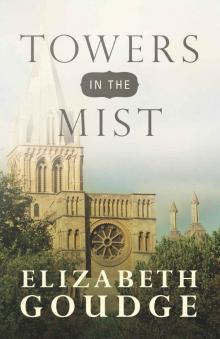 Towers in the Mist
Towers in the Mist Green Dolphin Street
Green Dolphin Street The Bird in the Tree
The Bird in the Tree The Child From the Sea
The Child From the Sea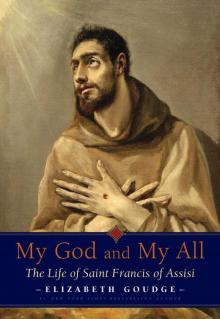 My God and My All: The Life of Saint Francis of Assisi
My God and My All: The Life of Saint Francis of Assisi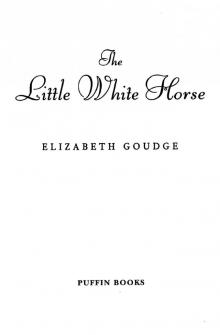 The Little White Horse
The Little White Horse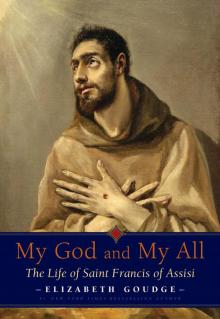 My God and My All
My God and My All B00CKXCNH8 EBOK
B00CKXCNH8 EBOK